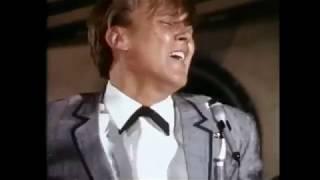Al Jolson (May 26,1886 Oct.23,1950), born in Lithuania, Russian Empire, was a highly acclaimed American singer, comedian, and actor, and the first openly Jewish man to become an entertainment star in America.
His career lasted from 1911 until his death in 1950, during which time he was commonly dubbed "the world's greatest entertainer. Numerous well-known singers were influenced by his music, including Bing Crosby, Frank Sinatra, Dean Martin, and Judy Garland.
By 1920, he was Americas most famous and highest paid entertainer. Between 1911 and 1928, Jolson had nine sell-out Winter Garden shows in a row, more than 80 hit records, and 16 national and international tours.
------
"Swanee" is an American popular song written in 1919 by George Gershwin, with lyrics by Irving Caesar. It is most often associated with singer Al Jolson.
The song was written for a New York City revue called Demi-Tasse, which opened in October 1919 in the Capitol Theater. Caesar and Gershwin, who was then aged 20, claimed to have written the song in about ten minutes riding on a bus in Manhattan, and then at Gershwin's apartment. It was written partly as a parody of Stephen Foster's "Old Folks at Home". It was originally used as a big production number, with 60 chorus girls dancing with electric lights in their slippers on an otherwise darkened stage.
The song had little impact in its first show, but not long afterwards Gershwin played it at a party where Al Jolson heard it. Jolson then put it into his show Sinbad, already a success at the Winter Garden Theatre, and recorded it for Columbia Records in January 1920. "After that," said Gershwin, "Swanee penetrated the four corners of the earth.". The song was charted in 1920 for 18 weeks holding No. 1 position for nine. It sold a million sheet music copies, and an estimated two million records. It became Gershwin's first hit and the biggest-selling song of his career; the money he earned from it allowed him to concentrate on theatre work and films rather than writing further single pop hits. Arthur Schwartz said: "It's ironic that he never again wrote a number equaling the sales of Swanee, which for all its infectiousness, doesn't match the individuality and subtlety of his later works.
Al Jolson - Swanee (1920)
His career lasted from 1911 until his death in 1950, during which time he was commonly dubbed "the world's greatest entertainer. Numerous well-known singers were influenced by his music, including Bing Crosby, Frank Sinatra, Dean Martin, and Judy Garland.
By 1920, he was Americas most famous and highest paid entertainer. Between 1911 and 1928, Jolson had nine sell-out Winter Garden shows in a row, more than 80 hit records, and 16 national and international tours.
------
"Swanee" is an American popular song written in 1919 by George Gershwin, with lyrics by Irving Caesar. It is most often associated with singer Al Jolson.
The song was written for a New York City revue called Demi-Tasse, which opened in October 1919 in the Capitol Theater. Caesar and Gershwin, who was then aged 20, claimed to have written the song in about ten minutes riding on a bus in Manhattan, and then at Gershwin's apartment. It was written partly as a parody of Stephen Foster's "Old Folks at Home". It was originally used as a big production number, with 60 chorus girls dancing with electric lights in their slippers on an otherwise darkened stage.
The song had little impact in its first show, but not long afterwards Gershwin played it at a party where Al Jolson heard it. Jolson then put it into his show Sinbad, already a success at the Winter Garden Theatre, and recorded it for Columbia Records in January 1920. "After that," said Gershwin, "Swanee penetrated the four corners of the earth.". The song was charted in 1920 for 18 weeks holding No. 1 position for nine. It sold a million sheet music copies, and an estimated two million records. It became Gershwin's first hit and the biggest-selling song of his career; the money he earned from it allowed him to concentrate on theatre work and films rather than writing further single pop hits. Arthur Schwartz said: "It's ironic that he never again wrote a number equaling the sales of Swanee, which for all its infectiousness, doesn't match the individuality and subtlety of his later works.
Al Jolson - Swanee (1920)
- Category
- Oldies
Sign in or sign up to post comments.
Be the first to comment


